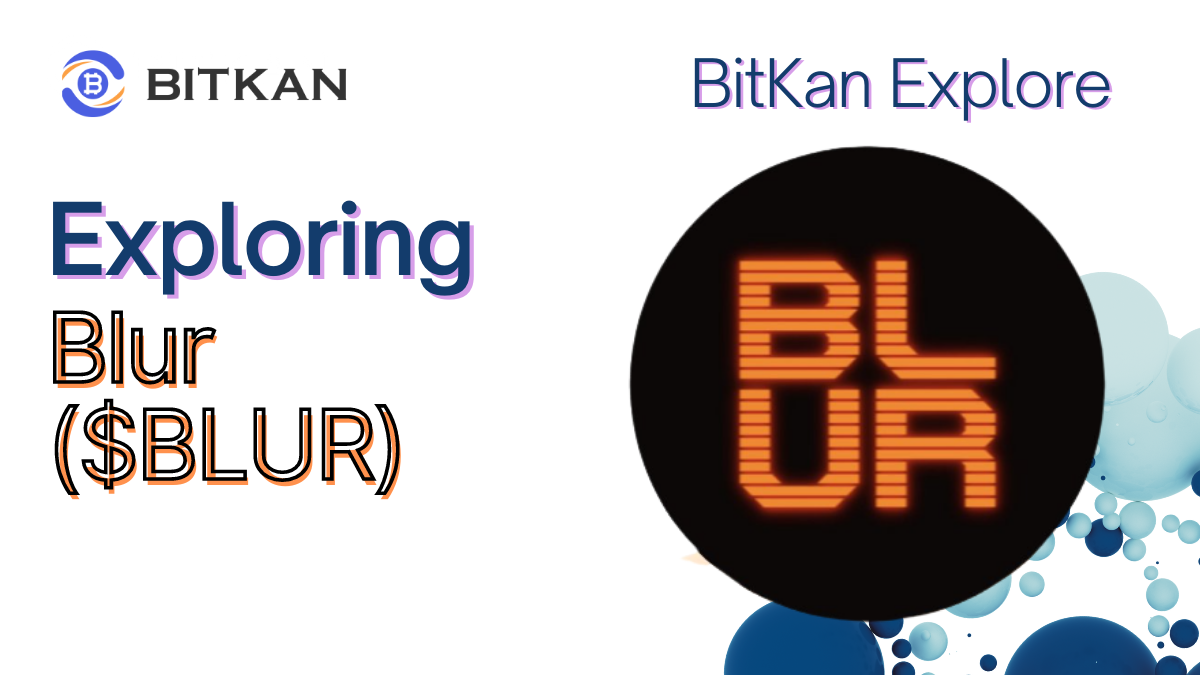Important things for investors to know about the legal and regulatory environment of blur coin
Blur: NFT | Blur: NFT login | Blur: NFT connect | WalletConnect | Traders | What Is Blur Crypto

Blur: NFT | Blur: NFT login | Blur: NFT connect | WalletConnect | Traders | What Is Blur Crypto
The world of cryptocurrencies has experienced dramatic growth in recent years, with numerous new coins entering the market. One such coin that has gained significant attention is Blur Coin. As an investor, it's crucial to understand the legal and regulatory environment surrounding Blur Coin to make informed decisions and mitigate potential risks.
Blur Coin:
Blur Coin is a decentralized cryptocurrency that aims to provide users with enhanced privacy and security. It utilizes advanced cryptographic techniques to protect transaction details and identity information, making it attractive to individuals seeking anonymity in their financial transactions.
Legal Considerations:
While the concept of a decentralized and anonymous currency is enticing, it's essential to consider the legal implications associated with Blur Coin. Governments and regulatory bodies around the world have varied approaches to cryptocurrencies, with some embracing them and others imposing strict regulations.
Investors should be aware of the legal status of cryptocurrencies in their jurisdictions and any potential restrictions or limitations on their trading and use.
Regulatory Framework:
Blur Coin's legal status can differ from one country to another. Some countries have established comprehensive regulatory frameworks for cryptocurrencies, while others are still in the process of developing clear guidelines. It's important for investors to understand the regulatory environment in the countries where they operate or intend to invest.
Regulatory measures can include requirements for registration or licensing, anti-money laundering (AML) and know-your-customer (KYC) procedures, and restrictions on certain activities or transactions.
Investor Protection:
Investors should also pay attention to the measures put in place to protect them from potential risks and fraud associated with cryptocurrencies. Regulatory bodies and exchanges can have different levels of security measures and safeguards for investors, including insurance policies and dispute resolution mechanisms.
Before investing in Blur Coin or any other cryptocurrency, investors should research and carefully consider the legal and regulatory environment to ensure their investments are protected.
Conclusion:
Understanding the legal and regulatory environment surrounding Blur Coin is crucial for investors who wish to navigate the cryptocurrency market. By being aware of the legal status, regulatory framework, and investor protection measures, investors can make informed decisions and mitigate potential risks, ultimately maximizing their chances of success in this evolving and often complex market.
Understanding the Legal and Regulatory Environment of Blur Coin
Blur Coin, like any other form of cryptocurrency, operates within a legal and regulatory framework that investors should understand before engaging in any transactions or investments. This framework not only protects investors but also sets guidelines and standards for the operation of cryptocurrencies in general. In this article, we will explore the key aspects of the legal and regulatory environment surrounding Blur Coin.
Legal Status of Blur Coin

Blur Coin is considered a decentralized digital currency, which means it operates on a peer-to-peer network without the control or regulation of any central authority. Its legality varies by jurisdiction, as some countries recognize cryptocurrencies as a legitimate form of payment, while others have imposed restrictions or outright bans on their use.
Investors should research and understand the legal status of Blur Coin in their respective countries to ensure compliance with local laws and regulations. It is also important to note that while Blur Coin may be legal in one jurisdiction, it may face legal challenges or restrictions in another, which can impact its overall utility and value.
Regulatory Oversight
While cryptocurrencies are often associated with decentralization and autonomy, regulatory oversight is still an important aspect of their operation. Regulatory bodies, such as financial authorities or central banks, may impose regulations or guidelines to ensure the stability, security, and integrity of the cryptocurrency ecosystem.
Blur Coin may be subject to regulations related to anti-money laundering (AML) and know your customer (KYC) requirements. These regulations aim to prevent illicit activities, such as money laundering or terrorist financing, by ensuring transparency and accountability in cryptocurrency transactions.
Investor Protection
Investor protection is a crucial consideration in the legal and regulatory environment of Blur Coin. Investors should be aware of the risks associated with investing in cryptocurrencies and take precautions to protect their assets and personal information.
One important aspect of investor protection is the availability of accurate and transparent information about Blur Coin. This includes information about its development team, technology, and potential risks associated with its use. Investors should also be cautious of fraudulent schemes or scams that may attempt to exploit the lack of regulation in the cryptocurrency market.
Conclusion
Understanding the legal and regulatory environment of Blur Coin is essential for investors who wish to engage with this cryptocurrency. By staying informed and compliant with local laws and regulations, investors can mitigate risks, protect their assets, and contribute to the growth and stability of the broader cryptocurrency ecosystem.
Varies by jurisdiction
Anti-money laundering (AML) and know your customer (KYC)
Accurate and transparent information
Subject to local laws and regulations
Financial authorities or central banks
Beware of fraudulent schemes
Why Investors Should Know the Legal and Regulatory Environment

Investing in Blur Coin can be a lucrative opportunity, but it's important for investors to understand the legal and regulatory environment surrounding this digital currency. Failure to have a clear understanding of the legal framework can expose investors to risks and potential legal issues.
Knowing the legal and regulatory environment is crucial for several reasons:
2. Investor Protection
Being aware of the legal and regulatory environment allows investors to protect their interests. Knowledge of consumer protection laws and regulations helps investors make informed decisions and avoid scams or fraudulent activities.
3. Risk Assessment
Understanding the legal and regulatory landscape helps investors assess the risks associated with Blur Coin. It enables them to evaluate the potential impact of new regulations or legal developments on their investments.
4. Market Stability
The legal and regulatory environment plays a crucial role in maintaining market stability. Investors who are aware of the rules and regulations governing Blur Coin can contribute to a more stable market, reducing the risk of market manipulation or volatility.
Investors interested in Blur Coin should actively seek information about the legal and regulatory environment. Resources such as Blur Traders provide valuable insights and updates to help investors navigate the legal landscape and make informed choices.
The Importance of Complying with Laws and Regulations
Complying with laws and regulations is of utmost importance for investors in the realm of Blur Coin. By adhering to legal requirements and regulatory frameworks, investors can ensure a secure and legitimate investment experience. Here are some key reasons why complying with laws and regulations is essential:
Legal protection: Compliance with laws and regulations provides investors with legal protection. By following the established rules, investors can avoid legal consequences and protect their assets and investments.
Reduced risk: Compliance helps to reduce the risk of engaging in illegal or fraudulent activities. By understanding and following the legal requirements, investors can minimize their exposure to scams, fraud, and other illicit practices.
Transparency and accountability: Compliance fosters transparency and accountability in the investment process. Laws and regulations often mandate the disclosure of essential information, ensuring that investors have access to accurate and complete details that facilitate informed decision-making.
Market stability: Complying with laws and regulations contributes to the stability of the market. These legal frameworks aim to create a fair and level playing field where investors can operate with confidence and trust. By adhering to these rules, investors play a part in maintaining market integrity.
Enhanced reputation: Investing in compliance demonstrates an investor's commitment to ethical practices and responsible investing. Such dedication to compliance can enhance an investor's reputation and attract more opportunities for collaboration and partnership.
In conclusion, complying with laws and regulations is crucial for investors in Blur Coin. It provides legal protection, reduces risks, fosters transparency and accountability, contributes to market stability, and enhances an investor's reputation. Investors should prioritize compliance to ensure a secure and successful investment journey.
Understanding the Legal Framework of Blur Coin
Blur Coin is a digital cryptocurrency that operates on a decentralized network, providing users with a secure and anonymous platform for transactions. However, it is important for investors to understand the legal and regulatory environment surrounding Blur Coin before getting involved.
The legal framework of Blur Coin varies from country to country, as different jurisdictions have different laws and regulations regarding cryptocurrency. It is crucial for investors to be aware of the legal implications and requirements in their own jurisdiction.
In some countries, cryptocurrencies like Blur Coin are fully recognized and regulated, with specific laws in place to govern their use and transactions. These countries may require individuals and businesses dealing with Blur Coin to register and obtain necessary licenses.
On the other hand, some countries may have a more ambiguous legal status for cryptocurrencies. While Blur Coin may not be explicitly prohibited, the lack of clear regulations can create uncertainty for investors and businesses operating within these jurisdictions.
Furthermore, it is important to consider the potential risks associated with investing in Blur Coin, such as money laundering, fraud, and regulatory violations. Investors should be cautious and conduct thorough due diligence to ensure the legitimacy and compliance of any projects or platforms they engage with.
For a comprehensive understanding of the legal and regulatory environment of Blur Coin, it is advisable for investors to consult legal professionals specializing in cryptocurrency law or seek guidance from regulatory bodies. Additionally, it is essential to stay updated on any changes or developments in the legal landscape to mitigate risks and make informed investment decisions.
In conclusion, understanding the legal framework of Blur Coin is crucial for investors to safeguard their interests and comply with applicable laws and regulations. By staying informed and seeking professional advice, investors can navigate the regulatory landscape and make informed decisions regarding their involvement with Blur Coin.
For more information about Blur Coin and its legal framework, visit Blur traders.
Blur Coin and Financial Regulations
As with any cryptocurrency, Blur Coin operates within the framework of financial regulations. These regulations are in place to maintain transparency, protect investors, and prevent illicit activities such as money laundering and terrorist financing.
Blur Coin complies with Anti-Money Laundering (AML) and Know Your Customer (KYC) regulations. AML regulations require financial institutions to implement measures to detect and prevent money laundering activities. KYC regulations require financial institutions to identify and verify the identity of their customers, ensuring compliance with anti-fraud measures.
Blur Coin also adheres to the regulations set forth by the Financial Action Task Force (FATF), an international organization that sets standards for combating money laundering and terrorist financing. These regulations include monitoring transactions, reporting suspicious activities, and maintaining accurate records.
Additionally, Blur Coin operates within the regulatory frameworks established by regulatory bodies such as the Securities and Exchange Commission (SEC) and the Financial Conduct Authority (FCA). These regulatory bodies provide oversight and ensure that Blur Coin and any associated investments comply with relevant securities laws and regulations.
Investors considering blur coin should familiarize themselves with the regulatory environment surrounding the cryptocurrency. It is important to understand the regulatory obligations and compliance measures implemented by Blur Coin to protect their investments and ensure a safe and secure trading environment.
Legal Obligations for Investors in Blur Coin
Investing in Blur Coin carries with it certain legal obligations that investors must be aware of and comply with. These obligations are put in place to protect investors and ensure the integrity and legality of the cryptocurrency market. As an investor in Blur Coin, you must adhere to the following guidelines:
Know Your Customer (KYC) Requirements
Blur Coin adheres to strict Know Your Customer (KYC) requirements, which means that investors must provide certain personal information to verify their identity. KYC requirements help prevent money laundering, fraud, and other illicit activities. Investors will need to provide their full name, address, and identification documentation. This information will be securely stored and used by authorized parties in accordance with applicable data protection laws.
Understanding Regulatory Frameworks

Investors in Blur Coin must familiarize themselves with the regulatory frameworks that govern the cryptocurrency market. While cryptocurrencies operate in a decentralized manner, they are subject to laws and regulations in different jurisdictions. It is essential to understand the legal and regulatory environment in which Blur Coin operates, including any licensing requirements, reporting obligations, and tax obligations.
Blur Coin is committed to complying with all relevant laws and regulations, and it is important for investors to do the same to mitigate any legal risks.
Seeking Professional Advice
Investing in Blur Coin can be complex, and it is advisable to seek professional advice before making any investment decisions. Consulting with a lawyer or financial advisor who specializes in cryptocurrencies can help investors navigate the legal and regulatory landscape, understand their rights and obligations, and make informed investment choices.
For more information on legal obligations for investors in Blur Coin, please visit Blur traders.
The Role of Regulatory Authorities in Blur Coin
Regulatory authorities play a crucial role in ensuring the security and stability of the financial system, including the regulation of cryptocurrency such as Blur Coin. Their responsibility is to protect investors and promote fair and transparent markets.
One of the main tasks of regulatory authorities is to establish and enforce rules and regulations for cryptocurrencies. They set standards for the operation of cryptocurrency exchanges, ensuring that they follow anti-money laundering (AML) and know your customer (KYC) regulations. This helps prevent illegal activities such as money laundering and terrorist financing.
In addition, regulatory authorities monitor the activities of cryptocurrency exchanges to ensure market integrity. They aim to prevent market abuse, such as market manipulation or insider trading, which can distort the fair value of Blur Coin and negatively impact investors. By monitoring the activities of exchanges, regulatory authorities can detect and take action against any suspicious or illegal activities.
Regulatory authorities also play a role in investor protection. They educate investors about the risks associated with investing in cryptocurrencies and provide guidelines to help them make informed decisions. They may issue warnings about fraudulent schemes or unregistered offerings to protect investors from potential scams.
Furthermore, regulatory authorities have the power to take legal action against individuals or entities that violate cryptocurrency regulations. They can impose fines, suspend operations, or even revoke licenses of exchanges that fail to comply with the rules. This helps maintain market integrity and protect investors from fraudulent activities.
In summary, regulatory authorities are essential in the cryptocurrency industry, including Blur Coin. They establish rules and regulations, monitor market activities, protect investors, and take legal action against non-compliant entities. By fulfilling these roles, regulatory authorities contribute to the overall stability and security of the cryptocurrency market, promoting investor confidence and trust.
How Legal and Regulatory Changes Affect Investors
Investing in Blur Coin, like any other investment, comes with its own set of legal and regulatory challenges. It is crucial for investors to stay informed about the legal environment surrounding cryptocurrencies in order to make informed decisions and navigate potential risks. This article will outline some key ways in which legal and regulatory changes can impact investors in Blur Coin.
Licensing and Registration Requirements
One important aspect of the legal and regulatory environment that investors need to be aware of is the licensing and registration requirements for participating in cryptocurrency investments. Depending on the jurisdiction, individuals and companies may need to obtain specific licenses or registrations to legally operate as a cryptocurrency investor or exchange. Failure to comply with these requirements can result in penalties and legal consequences. It is essential for investors to thoroughly research and understand the licensing and registration obligations in their respective jurisdictions before engaging in Blur Coin investments.
Taxation and Reporting Obligations
Another critical area that investors must consider is the taxation and reporting obligations associated with Blur Coin investments. Cryptocurrencies are subject to taxation, and investors are required to report their earnings and losses for tax purposes. The taxation rules for cryptocurrencies can vary depending on the jurisdiction, and it is essential for investors to consult with tax professionals or seek legal advice to ensure compliance with the applicable regulations. Failing to meet taxation and reporting obligations can lead to financial penalties and legal complications.
Additionally, regulatory changes related to taxation can significantly impact the profitability of Blur Coin investments. Changes in tax rates, deductions, or exemptions can directly affect the net returns on investments and should be carefully considered by investors. It is important to stay up-to-date with any updates or amendments to tax regulations that may impact Blur Coin investments.
Market Manipulation and Fraud Protections

Investors in Blur Coin need to be aware of the risks associated with market manipulation and fraud. Regulatory changes are often implemented to enhance investor protection and prevent fraudulent activities in the cryptocurrency market. These changes may include increased regulations on exchanges, stricter compliance requirements, or measures to identify and penalize market manipulators. By staying informed about the legal and regulatory environment, investors can better assess the risks and potential returns associated with Blur Coin investments and take necessary precautions to safeguard their investments.
Licensing and registration requirements
Investors need to meet the necessary requirements to legally participate in Blur Coin investments.
Taxation and reporting obligations
Investors must comply with tax regulations specific to cryptocurrencies and report their earnings and losses.
Market manipulation and fraud protections
Regulatory changes aim to protect investors from fraudulent activities and market manipulation.
Concerns and Risks for Investors in Blur Coin
Investing in Blur Coin, like any other cryptocurrency, comes with its own set of concerns and risks that potential investors should be aware of. Understanding these factors can help investors make informed decisions and mitigate potential losses.
Volatility:
One of the major concerns when investing in Blur Coin is its inherent volatility. Cryptocurrencies are known for their price fluctuations, and Blur Coin is no exception. Its value can change dramatically within a short period, making it a risky investment for those seeking stability. Investors need to be prepared for the possibility of significant losses, as well as potential gains.
Regulatory Uncertainty:
Another risk for investors in Blur Coin is the lack of regulatory clarity. Government regulations surrounding cryptocurrencies are still in their early stages, and laws can change rapidly. This uncertainty can lead to increased risks, such as potential crackdowns, regulatory hurdles, or restrictions on trading and investing activities. Investors should stay informed about the regulatory developments and be prepared to adapt their investment strategy accordingly.
Additionally, the regulatory environment for cryptocurrencies varies across different jurisdictions, further complicating the investment landscape. Investors need to consider the legal and regulatory implications of investing in Blur Coin in their specific country or region.
Cybersecurity Risks:
Investing in Blur Coin also exposes investors to cybersecurity risks. The decentralized nature of cryptocurrencies makes them attractive targets for hackers and cybercriminals. There have been instances of exchanges being hacked, resulting in the loss of investor funds. Investors need to take appropriate security measures, such as using reputable cryptocurrency exchanges, implementing strong passwords, and enabling two-factor authentication, to minimize the risk of theft or unauthorized access to their funds.
It is also important for investors to be cautious of phishing attempts, fraudulent schemes, and fake initial coin offerings (ICOs) related to Blur Coin. Scammers often take advantage of the hype and speculation surrounding cryptocurrencies to deceive investors and steal their funds. Conducting thorough research and due diligence before making any investment decisions is crucial to avoid falling victim to such scams.
In conclusion, investing in Blur Coin carries inherent risks and concerns that investors should carefully consider. The volatility, regulatory uncertainty, and cybersecurity risks associated with cryptocurrencies require investors to approach their investment decisions with caution and stay informed about the evolving landscape. Exercising diligence and adopting appropriate security measures can help mitigate potential risks and enhance the overall investment experience in Blur Coin.
Investor Protection Measures in the Legal and Regulatory Environment
Introduction
When it comes to investing in the world of blur coin, it is crucial for investors to understand the legal and regulatory environment that governs this digital currency. One important aspect of this environment is investor protection measures, which are designed to ensure that investors are given sufficient safeguards and rights in their investment activities.
Licensing and Registration Requirements
One of the key investor protection measures in the legal and regulatory environment is the requirement for blur coin exchanges and other related entities to obtain the necessary licenses and registrations to operate. This ensures that they adhere to strict standards and are subject to regular audits and inspections. By being licensed and registered, these entities are held accountable for their actions, providing investors with some degree of assurance that they are dealing with legitimate and trustworthy service providers.
Disclosure and Reporting Obligations
To protect investors, blur coin exchanges and other entities are required to provide clear and accurate disclosures regarding their operations and any potential risks associated with investing in blur coin. This includes providing information on the company's background, management team, financials, and any potential conflicts of interest. Additionally, these entities must regularly report on their activities, so that investors have up-to-date information to make informed investment decisions.
Anti-Money Laundering (AML) and Know Your Customer (KYC) Regulations
Investor protection measures also extend to preventing illicit activities, such as money laundering and financing of terrorism. Blur coin exchanges are required to implement robust AML and KYC procedures, which include verifying the identity of their customers and monitoring transactions for suspicious activities. These regulations not only protect investors from potential fraud but also help maintain the integrity of the financial system.
Dispute Resolution Mechanisms
In the event of disputes between investors and blur coin exchanges or other service providers, investor protection measures often include mechanisms for resolving these issues. This may involve arbitration or mediation processes, allowing both parties to find a mutually agreeable solution without resorting to costly and time-consuming litigation.
Conclusion
Investor protection measures are essential in the legal and regulatory environment of blur coin. These measures aim to safeguard investors' rights, promote transparency, and mitigate risks associated with investing in this digital currency. By understanding and complying with these measures, investors can have greater confidence in the security and reliability of the blur coin ecosystem.
International Perspectives on Blur Coin Regulations
Introduction:
As the popularity of cryptocurrencies continues to grow, governments around the world are grappling with how to regulate these new digital assets. Blur Coin, like many other cryptocurrencies, presents unique challenges due to its decentralized nature and the potential for illegal activities such as money laundering and terrorist financing. This section explores the various international perspectives on regulating Blur Coin.
United States:
The United States has taken a comprehensive approach to regulating cryptocurrencies, including Blur Coin. The Financial Crimes Enforcement Network (FinCEN) has classified Blur Coin as a virtual currency and requires exchanges and miners to comply with anti-money laundering (AML) and know-your-customer (KYC) regulations. Additionally, the Securities and Exchange Commission (SEC) has deemed certain Blur Coin offerings as securities, subjecting them to additional regulations.
European Union:
In the European Union, regulations surrounding Blur Coin vary by country. The European Securities and Markets Authority (ESMA) has issued guidelines on the regulatory treatment of cryptocurrencies, urging member states to establish a consistent approach. Some countries, such as Germany, have classified Blur Coin as a financial instrument subject to securities laws, while others have taken a more cautious approach and are still in the process of formulating regulations.
Asia-Pacific Region:
The Asia-Pacific region has seen a range of responses to the regulation of Blur Coin. In countries like Japan, Blur Coin is considered legal tender and subject to oversight by the Financial Services Agency (FSA). Australia has implemented a similar regulatory framework, treating cryptocurrencies as property subject to capital gains tax. On the other hand, China has taken a more restrictive approach, banning Initial Coin Offerings (ICOs) and cryptocurrency exchanges.
Emerging Markets:
In many emerging markets, the regulatory landscape for Blur Coin is still in its infancy. Some countries have opted for a cautious approach, issuing warnings to investors about the risks associated with cryptocurrencies. Others, such as Malta and Switzerland, have embraced Blur Coin and blockchain technology, creating favorable regulatory environments to attract cryptocurrency businesses and startups.
Conclusion:
As the global cryptocurrency market continues to evolve, so too will the regulatory landscape for Blur Coin. Governments around the world are grappling with striking the right balance between fostering innovation and protecting investors. International collaboration and coordination will be crucial to ensure consistent regulations that promote the growth of Blur Coin while mitigating risks.
Emerging Trends and Future Expectations for Blur Coin Regulations

The regulatory environment surrounding blur coin and other cryptocurrencies is rapidly evolving. As governments and financial institutions grapple with the challenges and opportunities presented by this emerging technology, new trends and expectations for blur coin regulations are taking shape.
Increased Regulatory Scrutiny
As blur coin gains more popularity and adoption, regulatory authorities around the world are increasing their scrutiny of this decentralized currency. Governments are concerned about the potential risks associated with blur coin, including money laundering, terrorist financing, and tax evasion. Therefore, they are taking steps to establish robust and comprehensive regulations to prevent these illicit activities.
Global Regulatory Harmonization

In order to effectively regulate a global currency like blur coin, there is a growing call for regulatory harmonization among different countries. As a result, international organizations such as the Financial Action Task Force (FATF) are working towards developing consistent regulatory frameworks that would allow for seamless cross-border transactions while ensuring the necessary safeguards and protections.
In addition to global harmonization, some jurisdictions are also working on creating their own specific regulations for blur coin. For example, certain countries have introduced licensing regimes that require cryptocurrency businesses to obtain licenses and comply with specific standards and obligations. These regulations aim to strike a balance between fostering innovation and protecting investors.
Transparency and Consumer Protection
Emerging trends in blur coin regulations are placing a strong emphasis on transparency and consumer protection. Authorities are pushing for clear disclosure requirements for cryptocurrency businesses, ensuring that investors have access to accurate and timely information about these digital assets. Additionally, regulatory measures are being implemented to safeguard consumer funds and address potential fraud or scams in the blur coin ecosystem.
Enhanced KYC/AML Requirements
Increased compliance burden for blur coin businesses and improved AML controls to prevent illicit activities
Regulation of Exchanges and Wallet Providers
Increased security and protection for users' funds, reducing the risk of hacks or thefts
Introduction of Stablecoins Regulations
Ensuring stablecoin issuers maintain adequate reserves to back their digital assets
Stricter ICO Regulations
Increased investor protection and reduction of fraudulent initial coin offerings
Overall, the future holds a more regulated environment for blur coin, with governments and regulatory bodies working towards creating frameworks that balance innovation and investor protection. As the technology and the market continue to evolve, these trends and expectations will shape the regulatory landscape and provide a more secure and transparent environment for blur coin investors.
Evaluating the Legal and Regulatory Environment of Blur Coin

Investors interested in Blur Coin should carefully evaluate the legal and regulatory environment surrounding this cryptocurrency. Understanding the laws and regulations that govern its operation can provide valuable insights into the level of risk and potential for long-term stability.
1. Government Regulations
The first aspect to consider is the stance of regulatory authorities towards cryptocurrency. Different countries have varying degrees of acceptance and regulation for digital currencies. Some governments may actively support and encourage the use of cryptocurrencies, while others may be more skeptical or even hostile towards them.
It is important for investors to consider not only the current regulatory landscape but also the potential for future regulations to be imposed. Changes in regulations can significantly impact the value and viability of a cryptocurrency like Blur Coin.
2. Legal Status
Investors should also examine the legal status of Blur Coin in their jurisdiction. Is it recognized as legal tender, a commodity, or a security? The legal classification can have implications for how Blur Coin is regulated and how it can be used in various transactions.
Additionally, investors should consider whether there are any legal restrictions on owning or trading Blur Coin. Some countries have banned or restricted the use of cryptocurrencies, which can significantly limit their potential market and increase risk.
3. Consumer Protection
A crucial aspect of evaluating the legal and regulatory environment is understanding the level of consumer protection provided to investors. Are there any mechanisms in place to safeguard against fraud, hacking, or other forms of misuse? Investors should look for regulatory frameworks that promote transparency, accountability, and security within the cryptocurrency ecosystem.
4. Taxation
Tax regulations can also impact the profitability and attractiveness of investing in Blur Coin. Investors should understand how profits from cryptocurrency investments are taxed in their jurisdiction. Is it classified as capital gains, income, or treated differently? Compliance with tax laws is essential for avoiding legal issues and potential penalties.
Overall, evaluating the legal and regulatory environment of Blur Coin is crucial for investors wishing to make informed investment decisions. Factors such as government regulations, legal status, consumer protection, and taxation can all impact the stability and profitability of investing in this cryptocurrency.
What is the legal and regulatory environment of blur coin?
The legal and regulatory environment of blur coin refers to the laws, regulations, and policies that govern the use of blur coin. This includes regulations related to digital currencies, money laundering, fraud prevention, and consumer protection.
Are there any specific regulations for investing in blur coin?
Yes, there are specific regulations that investors need to be aware of when investing in blur coin. These regulations vary from country to country, but generally include requirements for registration, disclosure of information, and compliance with anti-money laundering and know-your-customer rules.
What are the risks associated with investing in blur coin?
Investing in blur coin carries several risks. These include the volatility of the cryptocurrency market, the risk of hacking and theft, the potential for fraudulent activities, and the possibility of regulatory changes that could impact the value and legality of blur coin.
How can investors protect themselves in the legal and regulatory environment of blur coin?
Investors can protect themselves in the legal and regulatory environment of blur coin by conducting thorough research before investing, ensuring compliance with applicable laws and regulations, using secure wallets and exchanges, and being cautious of potential scams and fraudulent schemes.
What should investors know about the legal status of blur coin in different countries?
Investors should be aware that the legal status of blur coin can vary from country to country. Some countries may have embraced cryptocurrencies and established clear regulations, while others may have banned or imposed strict regulations on their use. It is important for investors to understand the legal landscape in their jurisdiction before investing in blur coin.
What is the legal and regulatory environment of blur coin?
The legal and regulatory environment of blur coin refers to the laws and regulations that govern the use and trade of blur coins. These laws and regulations vary by country and can impact the legality and security of investing in blur coin.
Blur: NFT | Blur: NFT login | Blur: NFT connect | WalletConnect | Traders | What Is Blur Crypto
2022-2024 @ Understanding the legal and regulatory environment of blur coin essential information for investors